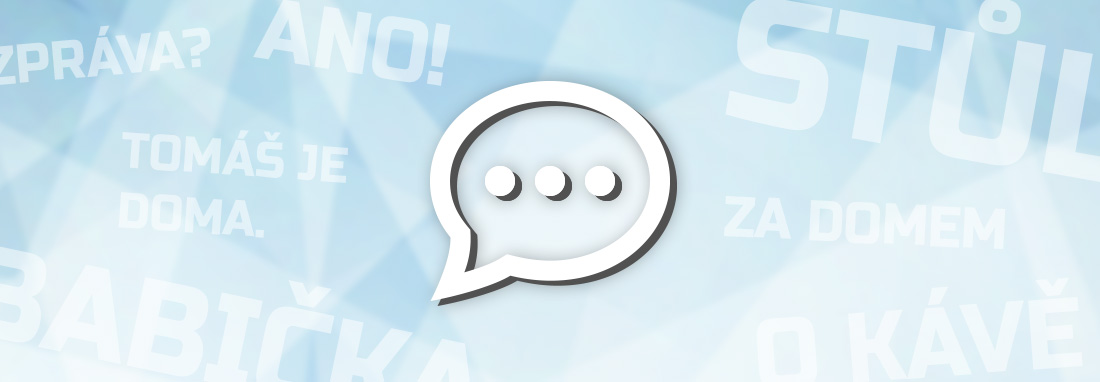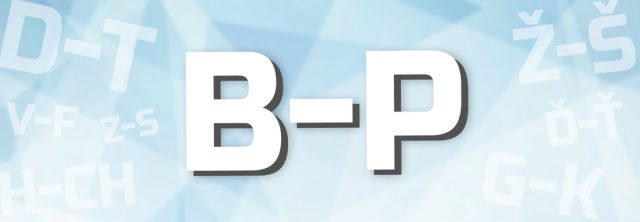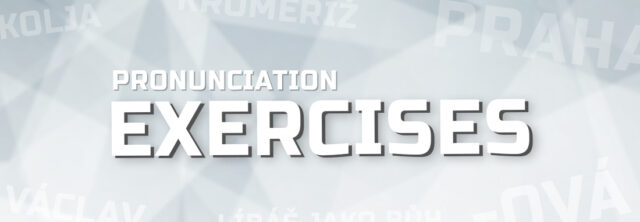The stress of all Czech words falls on the first syllable without any exceptions. The intonation is usually falling in affirmative sentences and rising in questions.
Stress
Unlike English, the stress is always on the first syllable. It has no lexical or phonological function and it never distinguishes the meaning of a word. Special diacritical signs do not denote stress!
Compare the following examples of the correct and wrong stress:
- babička
babička
babička
- peníze
peníze
peníze
- kostelík
kostelík
kostelík

blouse

scooter

square

raincoat
Students are often tempted to pronounce foreign words with the original stress. This could, however, lead to misunderstandings since the Czech language alters the pronunciation (and often even the spelling) of such words.
Stress with prepositions
In pronunciation, one-syllable prepositions merge with the following word and carry the stress.
It is important to get used to this as soon as possible because the distinctive sound of the first syllable of the noun suddenly becomes more silent. Examine the examples:
- stůl (table)
- na stůl (on the table)
- moře (sea)
- do moře (to the sea)
- Lídie (Lidia)
- bez Lídie (without Lidia)

about coffee

about tea

about juice

about wine
Here are some more examples of the pronunciation with one-syllable prepositions:
Assimilation with prepositions
The most tricky pronunciation rule is the combination of a preposition and the assimilation. Let’s take the preposition v (in) as an example. It can be pronounced as [v] or [f], depending on the first letter of the noun it is linked with. Examine the following examples:

[v lednu]
in January

[f únoru]
in February

[v listopadu]
in November

[f prosinci]
in December
This also happens when using other prepositions (k, pod, bez etc.). See how the last letter of the preposition changes into its voiced/unvoiced counterpart.
About intonation
Czech is not a tonal languages, which means that the intonation does not play such an important role as in other languages (e.g. Chinese and Swedish).
Since the Czech word order is very free, the right intonation can help understand the meaning of the sentence. The falling intonation is used in affirmative sentences while the rising one in questions. Examine the examples:
- Ano!Yes!
- Ano?Yes?
- Tomáš je doma.Tomáš is at home.
- Tomáš je doma?Is Tomáš at home?
- Přišla ti ta zpráva. You have received the message
- Přišla ti ta zpráva?Have you received the message?
- Petr chce jít taky. Petr wants to go as well.
- Petr chce jít taky?Does Petr want to go as well?

The swimming pool is modern.
Ten bazén je moderní?
Is the swimming pool modern?

The woman has a dog.
Ta žena má psa?
Does the woman have a dog?
Stress and intonation in sentences
Here are some sentences where you can observe both the stress of individual words and the intonation of the whole sentence.
- Pojedeme na večeři do restaurace s názvem U Zelené kočky.We’re going to have dinner at a restaurant called The Green Cat.
- S Martou dnes budeme cestovat do Lomnice nad Popelkou.Today Marta and I will travel to Lomnice nad Popelkou.
- Proč máte v kuchyni na zdi pověšené obaly od čokolády?Why do you have chocolate wrappers hanging on your kitchen wall?
- Je Tomův roztomilý pes z toho nového útulku na náměstí?Is Tom’s cute dog from the new shelter on the square?
The end
This is the end of the pronunciation course. At first, it may be difficult to keep all the rules in mind, but meeting the sounds more often, all of them will soon become automatic.
If you feel you are lacking a particular rule, go back and study the lesson again. You can also search for new words to practice with in the vocabulary section.
Now you can move to the final practice lesson to do the exercises.
- pečivo, moučník, táborák, houpačka, zahradnictví
- učebnice, odlitek, elán, andulka, identita
- katakomby, psychologie, kultura, politika, reputace
- encyklopedie, aligátor, iluze, akademie, inspirace
- do bazénu, bez lidí, ke stolu, na linku, s Karlem
- u židle, přes pole, o Lídě, po práci, při čtení
- v práci, před parkem, bez tužky, od Katky, k východu
- z tramvaje, pod talířem, přes dvůr, v pondělí, bez kamaráda
- Můj táta je dobrý.
- Erik má sestru.
- Rodiče jsou doma.
- Ty máš dlouhé vlasy.
- Sabina jede do práce.
- Jsi cizinec?
- Je tady pošta?
- Máte doma psa?
- Kde bydlíš?
- Proč nejsi ve škole?
- To je Marek. / To je Marek?
- Máma je doma. / Máma je doma?
- Patrik má kočku. / Patrik má kočku?
- Ten dům je starý. / Ten dům je starý?
- Váš mobil je moderní. / Váš mobil je moderní?










Just found your page on Google and it’s really useful to learn Czech.… Read more »